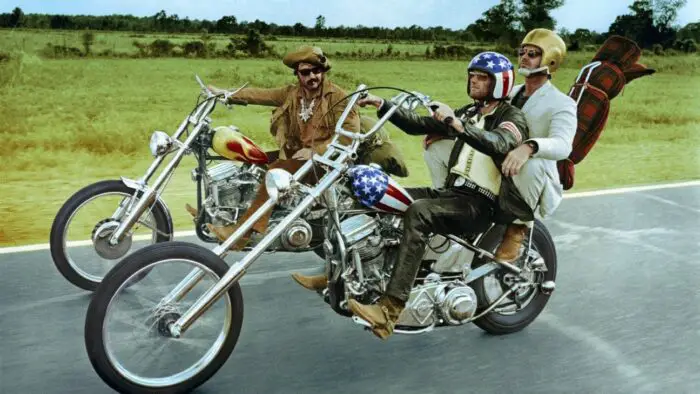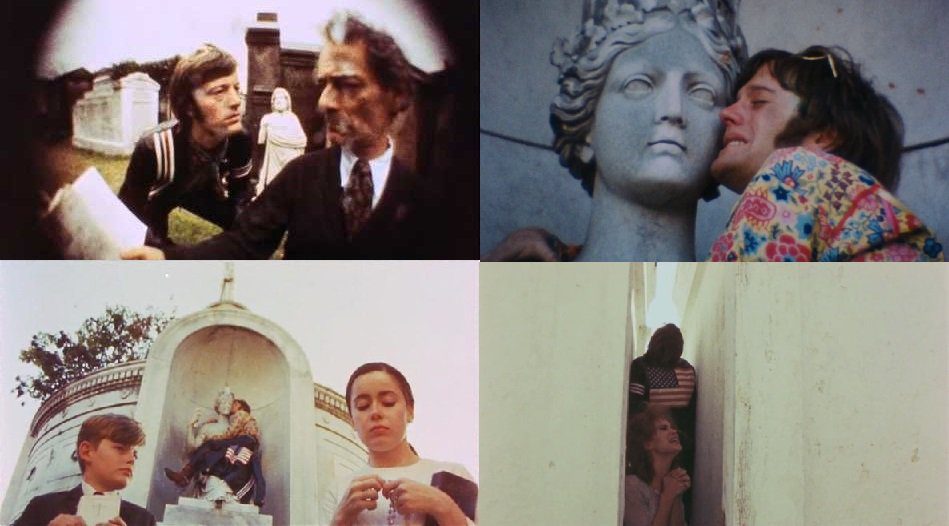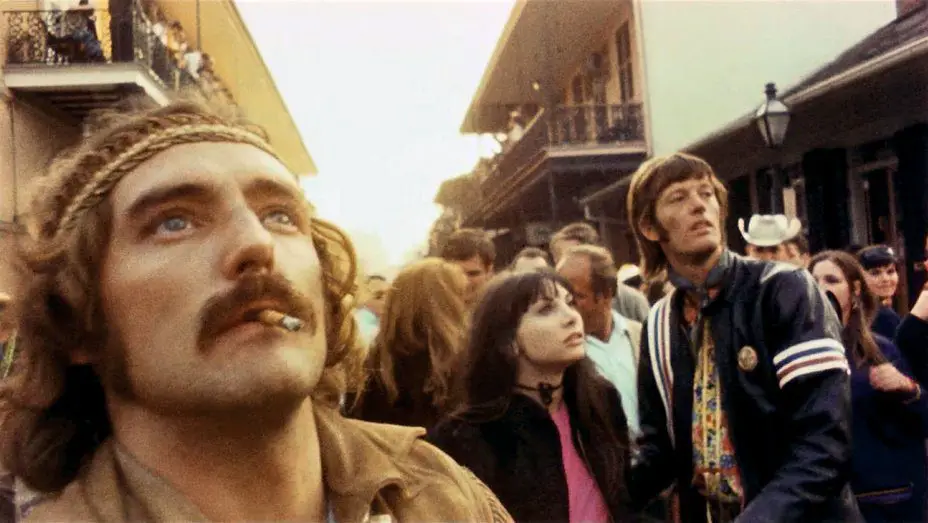This piece is dedicated to Peter Fonda. May you rest in peace, Captain.
Hey, man. Let’s talk, man, about Easy Rider. It’s all about the counterculture, man, being free, doing drugs, living together, and not conforming to the man, man. It helped meld independent films with mainstream Hollywood, man. And it’s…really, really weird…I mean…man.
Easy Rider’s origins are up for debate. Here’s what might have happened. Peter Fonda had become a counterculture icon due to his role in the 1966 Roger Corman film Wild Angels. He developed his Wild Angels persona further in the Jack Nicholson penned The Trip (1967) and then in today’s film. Fonda came up with the idea of a modern western but with bikers riding through the U.S.
Fonda brought the idea to Dennis Hopper, who Fonda had worked with on The Trip, and they developed the premise, with the idea being that Hopper would direct and Fonda produce. They eventually invited writer Terry Southern to aid in developing the story. Depending on who you talked to, Southern either wrote most of the script and Fonda and Hopper put their names on it later or Hopper did most of the heavy lifting. It may all be a moot point. Hopper and Fonda reportedly shot the film with no real script but with an outline and mostly adlibbed dialogue.
Easy Rider is slim on plot. Bikers Wyatt—aka Captain America (Fonda)—and Billy (Hopper) have just sold cocaine to a wealthy buyer and now have enough money to be “free.” Wyatt rides through their troubles with composure, what seems like bigger brains, and a deeper understanding of life than Billy. Billy lives an almost stream of consciousness existence. He relishes the drugs and seems only in life for fun, oblivious of the bigger picture.
Before using that money to their advantage, Wyatt and Billy set out from Los Angeles for Mardi Gras in New Orleans. Their trip takes them through the American Southwest and certain southern states. Along the way, they meet a hippy commune, conservative hillbillies and authority figures who don’t take kindly to the two’s long hair and unconventional ways, and an alcoholic, southern lawyer George Hanson (played by Jack Nicholson), who joins them on their trip.

Hopper and Fonda seemed determined to share their world of hippies and drugs with the rest of America. What I like about that is two-fold. I appreciate any movie that manages to introduce me to a people, community or world that’s unfamiliar. Being born waaay after 1969 and living as a total square who’s never even drunk a beer let alone used hardcore drugs, I was certainly seeing something new with Easy Rider. But what makes the film even better is it never glamorizes Wyatt and Billy or their freewheeling lifestyle. The movie presents everything and lets you pass your own judgments.
I can’t say the lifestyle is appealing to me, especially all the drugs, which are depicted without restraint. I believe the characters mainly use marijuana, but they also dabble a little in cocaine and LSD. The actors smoked actual marijuana during scenes, but the other two drugs were faked. With the view of marijuana being laxer in so much of the country these days, Wyatt and Billy smoking weed isn’t nearly as shocking as I’m sure it was for many uninitiated audiences in 1969. The cocaine use is so brief that a modern audience wouldn’t even blink at it. Let’s face it, it’s shown more prominently in so many shows and movies nowadays that this film is nothing. The LSD, though? Ooohhh, boy, let me tell you. That’s messed up.
The Trip introduced LSD to many of the public. I haven’t seen The Trip, but from what I’ve read, I’m sure that movie is more messed up than this one. Easy Rider’s LSD scene is absolutely bonkers, though.
Wyatt, Billy, and two prostitutes spend a few minutes experiencing the effects of LSD in a New Orleans cemetery. They talk nonsensically, Wyatt embraces a Madonna statue and refers to it as his mother, one of the women gets naked for no apparent reason, and those aren’t even the weirdest things that happen. Hopper shoots it so unconventionally and the actors behave so strangely that you’ll feel somebody slipped you LSD without you knowing it. Shots are situated at weird angles, the exposure and lighting are very off, and characters act completely unhinged. It’s the pinnacle of weird in an already weird movie. It seemed deeply unpleasant for the characters and definitely troublesome for me, but in a good way. Again, I enjoyed catching a glimpse of that world. The cinematography is excellent, and it’s probably one of the finest and most successful sequences of the film.

Another success is beautiful vistas of open-road America and Monument Valley. I particularly enjoyed seeing the American Southwest and the isolated, rural communities there at least at that time. It makes you want to get on your bike (or car, in my case) and take a road trip across the country.
Easy Rider also makes great use of popular music of the time in place of a traditional score. It was a revolutionary, uncommon but not unheard of concept also sort of done by The Graduate two years earlier. The soundtrack is exceptional not just aurally but tonally. Songs like Steppenwolf’s Born to be Wild, The Holy Modal Rounders’ If You Want to Be a Bird, and the Roger McGuinn, of The Birds, cover of Bob Dylan’s It’s Alright Ma (I’m Only Bleeding) set just the right mood of freedom in the first case and utter strangeness (remember, they’re on drugs) in the latter two.
All these elements combine to create a sincere experience that puts you in the biker boots of these two weed-smoking, freedom-loving hippies. It’s informative and always interesting. And despite a thin plot, Easy Rider adds, perhaps, a surprising amount of layers to its characters and their lifestyle.
After watching Easy Rider, Columbia’s chief executive, Leo Jaffe, reportedly said, “I don’t know what the f*** this picture means, but I know we’re going to make a f*** of a lot of money.” I think it’s safe to say many people didn’t get Easy Rider. I barely understand this drug-fueled, bloody film questioning the correct way to live. I can’t imagine how an older generation used to John Ford and Henry Fonda must’ve reacted to such fare.
Still, while I personally have no interest in popping this back into the DVD player, I can say it’s required viewing for any film lover. True to Jaffe’s prediction, the movie took in a buttload of money ($60 million on a $360,000 to $400,000 budget) and was the third highest-grossing film of 1969, behind only Midnight Cowboy (number two) and Butch Cassidy and the Sundance Kid (number one). More importantly, it helped bring independent films into the mainstream and to usher in a new era of filmmaking. It ignored old Hollywood practices and paved its own way to the films of the ’70s and beyond.

Easy Rider is available on DVD and Blu-ray through the Criterion Collection.



